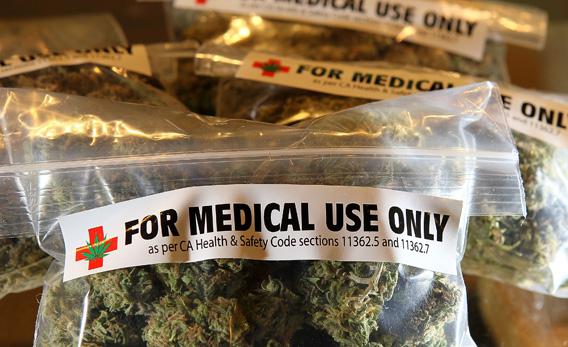Colorado and Washington legalized recreational marijuana use on Tuesday, putting the states at odds with the federal government, which categorizes the drug as dangerous and medically useless. Marijuana advocates point to 6,000 studies on cannabis in the past three years, some of which show medical promise and little risk for adults. How do you get into a marijuana study?
Just call the researchers. The National Institutes of Health maintains an online database of clinical trials that are in the recruitment process. As of this writing, there are approximately 100 marijuana studies currently enrolling patients. Each listing contains inclusion criteria (the types of people the researchers are looking for) and exclusion criteria (characteristics that will remove otherwise qualified people from contention). Some studies are limited to patients afflicted with serious illnesses, like the “Medical Marijuana Use in HIV+ Patients Prospective Cohort Study” currently enrolling at Wayne State University. And not all of them involve the promise of free pot. “Alcohol, Marijuana, and Risky Sex: Group Interventions With Detained Adolescents,” for example, is aimed at reducing marijuana use among teens. But there are a few trials that might interest someone looking for a free high. Consider the University of Iowa’s “Effects of Inhaled Cannabis on Driving Performance.” Participants will be dosed with varying amounts of alcohol or vaporized cannabis, then placed into a driving simulator to measure their performance. There are some restrictions. You must be a social drinker and marijuana user already, but you can’t have an addiction. People who are susceptible to motion sickness are out, and you must live near the driving simulator in Iowa. Keep in mind that getting into the study doesn’t guarantee free marijuana—two control groups will get no THC whatsoever. (Previous studies have shown that low doses of marijuana have little to no impact on driving performance.)
If you don’t want to take a chance on landing in the placebo group—or if you don’t happen to live in Iowa—there are other options. Researchers in Baltimore are studying how traces of cannabis appear in saliva. They’re looking for people who smoke marijuana at least twice a month to come in, smoke a joint, then provide blood, urine, and saliva samples. There is no control group, so all participants will score weed. You would have to stay at the testing center for six hours after smoking and pass a coordination and balance test before leaving. If you like a little pain with your pleasure, the “Cannabinoid Modulation of Pain” study at Yale might interest you. (Most cannabis studies are conducted at colleges and universities, which happen to have plenty of qualified and willing participants.) Participants will have capsaicin—the chemical responsible for chili pepper heat—applied topically, then receive a dose of cannabis to determine if it dulls the burn.
The majority of cannabis studies involve therapeutic use. Over the past 11 years, the Center for Medical Cannabis Research at the University of California, San Diego has investigated the drug’s potential to help people suffering from multiple sclerosis, spinal cord injuries, and AIDS. A significant portion of the center’s funding went toward navigating the approval process. Before a marijuana study can get going, the Food and Drug Administration, the National Institute on Drug Abuse, and the Drug Enforcement Administration have to give their approval. It usually takes at least a year before the government will agree to release some of its marijuana supply—all of which is grown at the University of Mississippi. The drug arrives in the form of cigarettes, which contain varying amounts of cannabis. (The placebo cigarettes are marijuana-free.) Although the California state-funded center was able to win approval for all of its studies, investigators with fewer resources and institutional backing have complained that getting approval is extremely difficult.
Got a question about today’s news? Ask the Explainer.
Explainer thanks Igor Grant of the University of California Center for Medicinal Cannabis Research.
